- Home
- Barry Unsworth
Losing Nelson Page 12
Losing Nelson Read online
Page 12
There it is again: embarkation. They were embarked—so much is certain. That same afternoon they came out of their forts, carrying with them the personal effects they were intending to take to France. But they did not sail. They waited there in the harbour, under the eyes of the English ships, crowded together on the small transports, men, women, and children—for many of the men had been joined by their families. Then, on the morning of the twenty-eighth, the expected letters were received from Palermo: Horatio was officially authorized to act. The transports were brought under the English guns and the people aboard them made prisoners.
You detested the French, that much is beyond doubt. I remembered your solemn words of advice to a young midshipman: You must hate a Frenchman as if he were the devil. You also detested rebels, and these were rebels doubly detestable: they had leagued themselves with the French. But you would never have allowed that to sway you from the path of honour. You, more than any other Englishman who ever lived, epitomize our great past, you are the standard-bearer to this more tarnished age, you gave your life, you cleared the seas of our enemies for a century to come. Was there a distinction in your mind between embarking and sailing? Could you have thought those people in the forts would come out only to be embarked and not to sail? That hasty note—it was written by Sir William Hamilton and sent by him to Ruffo. It was written in French, a language of which you were largely ignorant. Could this foxy diplomat have deliberately omitted something you intended him to include, something to make that crucial distinction clear? But if so, where was the proof? And how can one explain the subsequent declaration, made in your name by Captains Troubridge and Ball, in which you repeated the undertaking not to oppose the embarkation? Was it possible for Ruffo to take this document in any other sense than as an agreement on your part to allow the treaty to be put into effect?
I was now at the heart of the problem that had held up my book and exhausted my mind for more than two months by that time. And I was no nearer a solution that March evening than I had been at the outset. I was beginning to feel the usual nausea of defeat, that slackening and slipping away of the mind which seemed like a foretaste of death. Always worse, compounded by all the previous failures … Quite suddenly I remembered Miss Lily’s words: It was a show, they were stars. Ludicrously inappropriate to talk about Horatio in that way. But perhaps, in the absence of any other sort of evidence, some clue to the truth of those June days could be found in the personages involved, in the interplay of character. A cast of six: the two protagonists in conflict, Horatio and Ruffo; the diplomatic go-between, Hamilton; the confidante and messenger of the queen, Emma; and their Sicilian majesties, Ferdinand IV and Maria Carolina, in whose names these actions were taken. I could make a brief sketch of each in turn and see what light was cast, if any. Not a course of events, a maze of personality. There can be more than one way into a maze, and which you have chosen doesn’t matter once you are in it. I started with the diplomat.
Sir William Hamilton. Sixty-eight-years old at this time, tall and lean, slightly stooped, from either scholarly activities or the many years of elaborate courtesies at the Neapolitan court; a man of distinguished appearance, with an aquiline nose and an air of intelligence and refinement. Son of Lord Archibald Hamilton, grandson of the third Duke of Hamilton, he had served for some years as an officer in the Third Foot Guards and had been—very briefly—member of Parliament for Midhurst. Younger son of a younger son, he had no money of his own, a state of things he remedied in 1758 by marrying an heiress, through whom he obtained an estate in Wales worth about £8000 a year. In 1764 he joined the Diplomatic Service, a career for which by background and manners he was well fitted. The delicate state of his wife’s health made Naples, with its sea air and warm climate, a natural choice. The marriage by all accounts was happy. The first Lady Hamilton died in 1782, and in the following year, returning to England with her embalmed body for burial, he met the extremely beautiful young woman who was his nephew’s mistress. She called herself Emma Hart at this time and was to become the second Lady Hamilton and Horatio’s great love. (I had been fascinated to learn that he met her at the same hotel, Nerot’s in St. James’s, where eighteen years later Fanny and Emma were to endure the mutual dislike of their first encounter.)
That September of 1798, when Horatio, the victor of the Nile, came sailing into the bay, Hamilton had been British envoy extraordinary and minister plenipotentiary to the court of Naples for thirty-six years. A man of elegant manners, all were agreed. A keen sportsman, hunting companion of King Ferdinand—they slaughtered thousands of quail and woodcocks together. A more than competent musician. He played the cello and kept his own band of musicians. He made experiments with electricity, kept a tame monkey, and planted an English garden in the grounds of the royal palace at Caserta. William Beckford said of him: “The first of connoisseurs—not only in the fine arts, but in the science of human felicity.” The best dancer at the Neapolitan court, it was said, though his dancing days were drawing to a close by then, must have been—he was feeling his age, his liver was in bad shape. Too many banquets. The wild and voluptuous Sicilian dance, the tarantella, which was all the rage, was probably beyond him. Emma, still only thirty-three, danced it wonderfully well … From February of the following year, the year of the Jacobins, Horatio and Emma were sleeping together, as regularly as Horatio’s duties would allow.
I paused at this point to pace about the room for a while. No clue in the bare facts of anyone’s life. A typical product of his time and class. He seems not to have believed in anything much. Prejudices and opinions, yes, but no very firm principles. He wanted to pass his days agreeably. And yet in one or two important ways he wasn’t typical at all. What really distinguished him was his very refined taste. Connoisseur, collector of classical antiquities, expert vulcanologist … He had one of the best collections of antique vases in private hands. And he was tolerant to an extraordinary degree. Victorian biographers deny that he knew of the adultery, deny that there was any adultery. But all the evidence goes to show that there was and he did. Not only knew, but fully accepted it, lived in the knowledge of it, unruffled and benign. All three lived under the same roof, they saw each other every day. Emma had been passed on to him; perhaps he was ready to pass her on in his turn, feeling himself too old, too tired? A woman, of whatever class, was always a commodity. And for a collector, of course, anything could be passed on, people as well as objects. Just a matter of rearrangement. I remembered reading somewhere that when he returned to London in 1800, his days of foreign service over forever, the house he took in Piccadilly had garden statuary that outraged his taste. It gave him a headache just to look at it. He could not live in the house until he had got rid of it all and put there in its place an antique statue of the Nile.
Nowhere any evidence that this exquisite sensibility suffered through thirty-six years at the corrupt and devious court of Naples. Presumably there was nothing in this to outrage him—moral outrage was probably not much in his line. A collector acquires things, sets them out, finds the right arrangement. If it doesn’t look good here, we shift it there. I had quoted in my book some lines from a letter of his that very well illustrated this readiness to shift things. Written to Sir John Acton, prime minister in the Neapolitan court, the queen’s adviser and rumoured former lover, perhaps the most powerful man in the kingdom: However, after good reflection, Lord Nelson authorized me to write to his Eminence yesterday morning early to certify to him that he would do nothing to break the Armistice … That produced the best possible effect … If one can’t do exactly what one wishes, one must act for the best; and that is what Lord Nelson has done; I hope therefore that the result will be approved by their Sicilian Majesties …
That is a shifty letter. What does it mean? Acton would have known, presumably. This was June 27, when the rebels had already been embarked. If one can’t do exactly what one wishes, one must act for the best. In what way did you act for the best? What you wanted is clear enough: you wanted unconditional
surrender. And all the rest of your life you maintained that that was what it had been. What can Hamilton be talking about? The assurance was given, Naples was restored to calm, the Jacobins came out and embarked on their transports. Two days later they were seized; the transports were converted into floating prisons.
Yes, there is no doubt that Hamilton was shifty. Highly diplomatic, to call it by a gentler name. He even, in a later despatch to Lord Grenville at the Foreign Office, says that the Jacobins were already on the transports on June 14, already there before you arrived, and that there was an urgent need to arrest them because they were about to set sail! No question of subterfuge, no question of what the garrisons were led to believe. So he became the first in that long line of obfuscators that extends to the present day, those who have smirched you, who were all truth, by their lack of it. Grenville could not have believed it, in any case. His view of Hamilton’s conduct comes out clearly enough in his letter to the new ambassador in Palermo, asking him to explain to Sir William, without reserve, the utter impossibility of his going back to Naples in any public situation. Though this, of course, may be due more to disapproval of an ambassador’s sharing his wife with an admiral at a foreign court.
In the stress of these thoughts, I fell to pacing from bookshelf to wall. Approach the bookshelf, choose a book. This evening it was Harold Acton’s The Bourbons of Naples. Choose a word in the title. You can choose any word, but once you have chosen, you must keep to it. I chose Bourbons. Forefinger of the right hand, touch the word, then straight across, six paces, touch the wall with both palms flat against it, thumbs horizontal but they mustn’t touch. Then six paces back to the shelves, touch the word again. Very soothing. The only other thing about Hamilton that came to my mind that evening, as I went through my paces, was the fact that he had recently suffered a grievous loss. Earlier that year he had heard that the Colossus, bound for England with his entire collection of classical treasures aboard her, the cherished hoard of a long career, had been wrecked off the Scilly Isles. Nothing of the cargo was saved but the corpse of Admiral Lord Shouldham, preserved in spirits. The kind of thing to break the heart of an elderly aesthete—a dead admiral pointlessly rescued, his precious collection lost in the depths. Did he somehow hold the Jacobins responsible? Habitual cynicism, embittered by such a loss, might have made him vindictive …
I went back to my desk, settled down to write again. Who next? Who but the detested adversary, the man behind the treaty?
Cardinal Fabrizio Ruffo. Fifty-five years old at the time of these events, active and vigorous. Member of an ancient, princely family, inheritor of vast feudal estates in his native Calabria. In his younger days a prominent member of Roman high society. (He was descended from the Roman family of Colonna on his mother’s side.) For a while he was the lover of the marchesa Girolama Lepri, notorious for her promiscuity. This was a profligate, licentious, profoundly corrupt society. By all accounts Ruffo was entirely at home in it. Horatio calls him a “swelled-up priest,” but he had never taken orders. His cardinal’s hat had been bestowed on him when he retired from the post of treasurer-general to the Vatican—some say in order to get rid of him after a suspected misappropriation of funds. Slander, probably; a man like that would not have lacked for enemies … Of all the nobles and court hangers-on that fled with their majesties to Palermo, he is the only one to show spirit. With the blessing of Ferdinand and Maria Carolina—though without their material assistance—he leaves Sicily on January 27, 1799, four days after the proclamation of the republic in Naples. His declared object: to promote and lead a counter-revolution, drive out the French, suppress the republican rebels, restore the kingdom of Naples to Ferdinand.
At the beginning of February he lands in Calabria with only eight followers and proclaims a holy war to rid the kingdom of foreign atheists. Within a few weeks, 17,000 fierce and undisciplined irregulars have flocked to his standard. This horde—the Christian Army of the Holy Faith, as Ruffo calls it—sets off from Naples bearing the Sicilian royal standard and spreading terror as it advances. Their numbers are swelled by bands of brigands and by some thousands of convicts released from Sicilian jails.
Success is rapid. By the beginning of June the French have withdrawn, leaving only a garrison in the castle of Sant’Elmo. On the fourteenth, Ruffo lets loose his Christian army on Naples. No, that is to misrepresent him; he can no longer hold it back. The Jacobin rebel militia take refuge in their two forts of Nuovo and dell’Ovo. Ruffo’s troops give themselves up to slaughter and pillage. They are joined by the street people of Naples, called the lazzaroni, a ragged army many thousand strong, fiercely loyal to the king. Anyone suspected of Jacobin sympathies—and it is enough to be respectably dressed—is hauled off to the main square and butchered on the spot.
I paused at this point to consider the situation now facing the victorious Ruffo. The city is in chaos. His troops openly defy his attempts to restrain them. A visiting German author, August von Kotzebue, describes the terror of those days in his Travels through Italy. One or two extracts were there in my book.
The lazzaroni roasted men in the streets and begged money of the passers-by to purchase bread to their roast meat. Many of them carried in their pockets fingers, ears, etc. which they had cut off; and if they met a person they looked upon as a patriot, they triumphantly exhibited their bloody spoils … All who wore cropped hair fell victim to the mob. False tails were procured but the people ran behind anyone that passed, pulling him by the tail, and if it came off, it was all over with the wearer …
Touch the word, six paces, palms against the cool wall. Naples given over to a festival of blood. People dragged out of their houses, on any pretext or none, men, women, and children, and hacked to death on the streets. The slaughter went on through the night, lit by the flames from buildings set on fire by the looters or by incendiary bombs from the besieged republicans in their forts.
What was Ruffo to do? He was not burdened by principle, any more than Hamilton—in fact, these two had a great deal in common. The aesthete and the pragmatist, both deep-dyed. Not much difference. The cardinal’s main purpose in all this, from the very beginning, had been to secure Bourbon gratitude and the rewards he hoped would follow. He was cynical, opportunistic, completely egotistical. His whole career goes to show this. But above all he was very, very realistic and therefore entirely unheroic, light-years away from an angelic nature like Horatio’s.
This was the main difference, but there was another. I wanted to be fair to Ruffo, to try to see things as he would have seen them that afternoon as he sat arguing there and the rage mounted. Otherwise there was no point in assembling these people, there could be no exit from this maze of personality, I would just go walking round and round in it. Ruffo was a royalist because the power of the great families was guaranteed by the monarchy. But he had no devotion to the Bourbon cause or to any other. The thing that really marked him out was that he was an Italian, and Calabrese at that; Naples was his city. He cared what happened to her and to her people. A Spanish king, an Austrian queen, a prime minister half English and half French, a British ambassador … So he makes the treaty, knowing it will not be welcomed in Palermo but believing himself to be authorized, as vicar general and Ferdinand’s accredited representative, to act on his own initiative. The objective is gained; he sees no point in further bloodshed. But the others do; they are intent on punishment, especially the fearful and vindictive Carolina, from whom in one way or another they all take their tone. Yes, even you, Horatio.
Then, on that morning of the twenty-sixth, after all the quarrelling, there comes the volte-face. Ruffo finds in his hands first Hamilton’s hasty assurance, then the declaration delivered by the captains—which they refuse to sign. His Lordship will not oppose the embarkation.
And in fact you did not. Now comes the question: if on someone’s part there was an intention to deceive, who in fact was deceived? Was it Ruffo? Domenico Sacchinelli, the cardinal’s secretary, in his account of the even
ts of that morning, says that his employer suspected something was wrong: The Cardinal, although he suspected there might be here some treachery, not wishing to wrangle with those two captains, took no further measure beyond deputing the Minister Micheroux to accompany those two captains to the Castles to arrange with the republican commanders the execution of the articles agreed upon.
Why should he suspect treachery? Not because the captains refused to sign; there was no reason for them to sign, they were the transmitters, not the authors. Surely, then, because of the equivocal tone. In that case, why didn’t he demand further clarification? Why, above all, did he send to Micheroux, together with the ambiguous documents he had received, a letter in his own hand stating that Lord Nelson had consented to carry out the capitulation, a clear exaggeration of their import? Did he believe what he wrote or merely pretend to believe it? Perhaps he didn’t suspect anything at all? Sacchinelli was writing many years later, working from notes and memories. He was on a pension from the Bourbon court; he wanted to shift the blame to the English for the terrible things that happened afterwards.
In this business, wherever one pressed, a dark syrup of treachery came oozing round the edges. But whose? Whose was the mind, whose were the glances? The rebels came out to atrocious deaths. Was it Emma? The thought sent me back to my desk again. Difficult to write briefly about Emma; there was so much of her, and so much of it was folly. Her beauty, her vulgarity, her extraordinary spelling, her capacity to absorb and deal out flattery … However, there was no play without her; the attempt had to be made.
Emma, Lady Hamilton. Born in 1765 to a colliery blacksmith and his wife on the Wirral Peninsula in Cheshire. Baptized in the name of Emy Lyon. No birth certificate yet found. Father signed his marriage certificate with a cross. The hamlet where she was born one of the most wretched and squalid in the land, a collection of hovels lived in by the colliers who worked in the nearby pit. Difficult to imagine, even in those times, more miserably deprived beginnings to life.

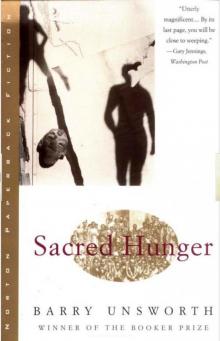 Sacred Hunger
Sacred Hunger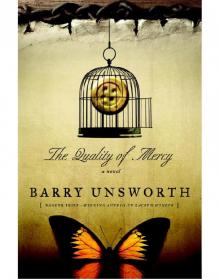 The Quality of Mercy: A Novel
The Quality of Mercy: A Novel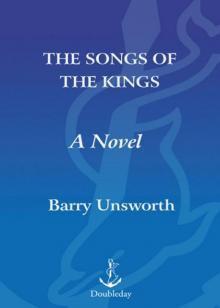 The Songs of the Kings: A Novel
The Songs of the Kings: A Novel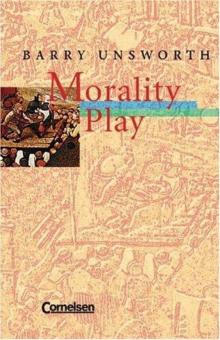 Morality Play. Mit Materialien. (Lernmaterialien)
Morality Play. Mit Materialien. (Lernmaterialien)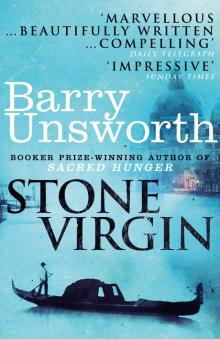 Stone Virgin
Stone Virgin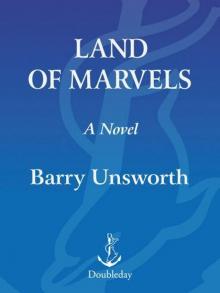 Land of Marvels
Land of Marvels Mooncranker's Gift
Mooncranker's Gift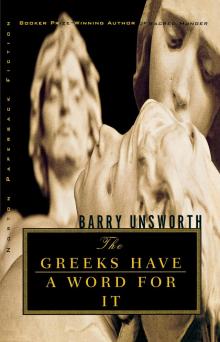 The Greeks Have a Word for It
The Greeks Have a Word for It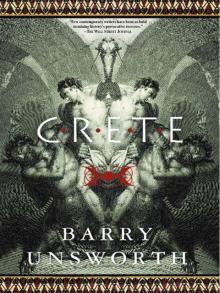 Crete
Crete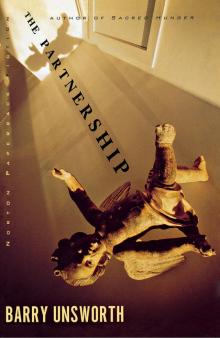 The Partnership
The Partnership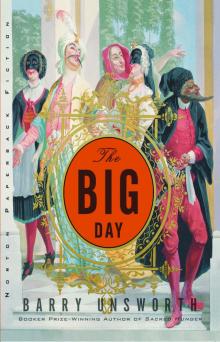 The Big Day
The Big Day The Hide
The Hide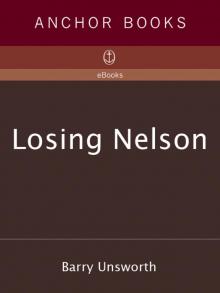 Losing Nelson
Losing Nelson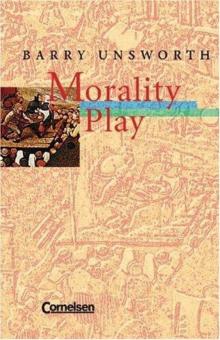 Morality Play
Morality Play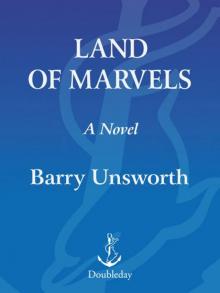 Land of Marvels: A Novel
Land of Marvels: A Novel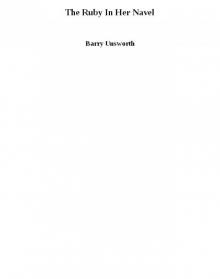 The Ruby In Her Navel
The Ruby In Her Navel